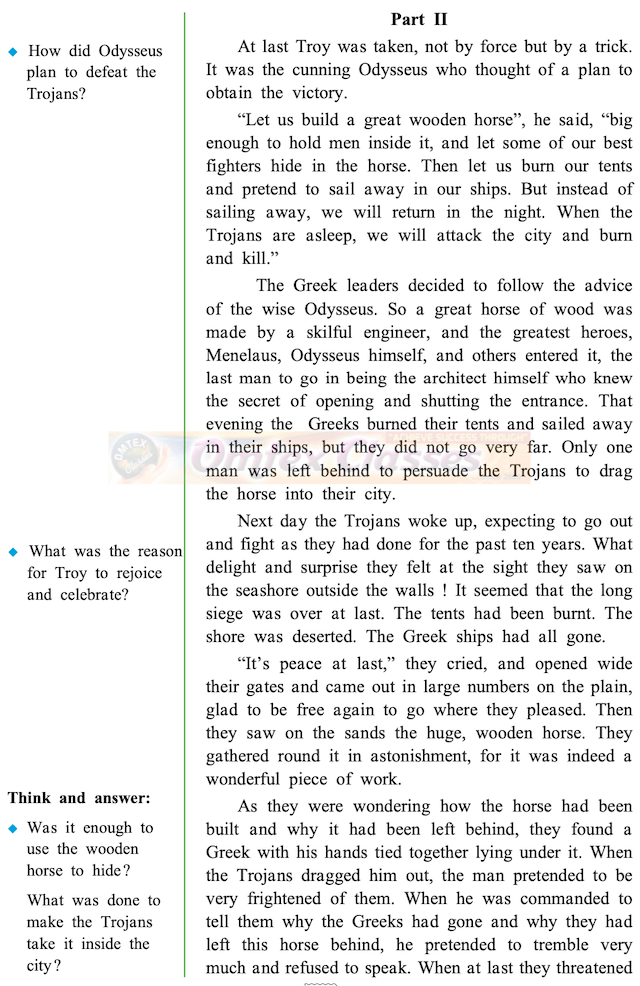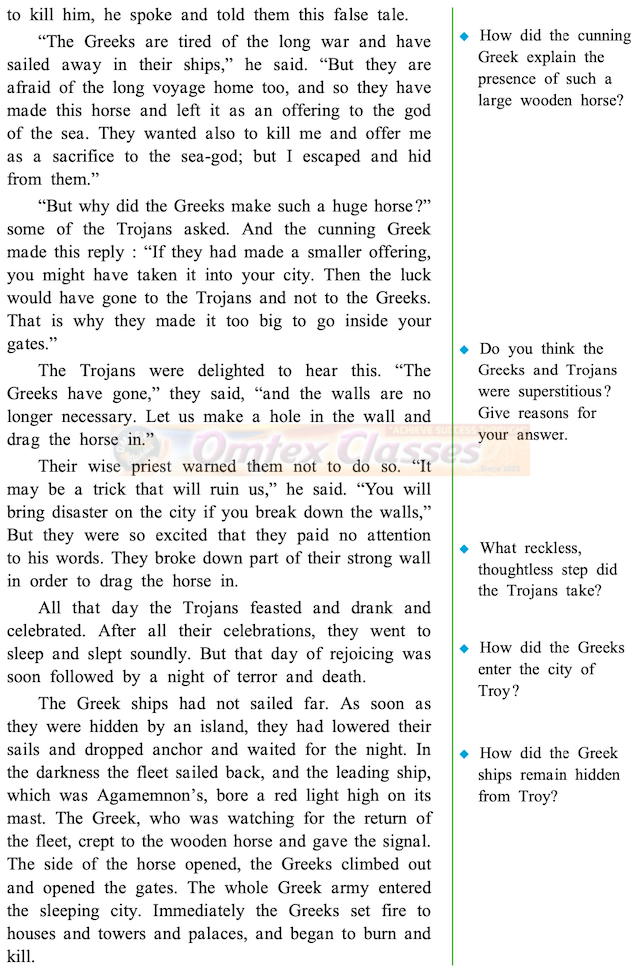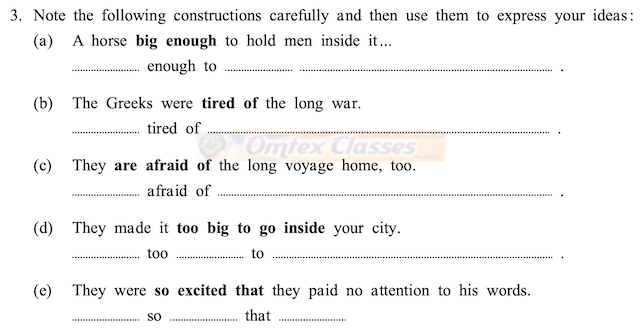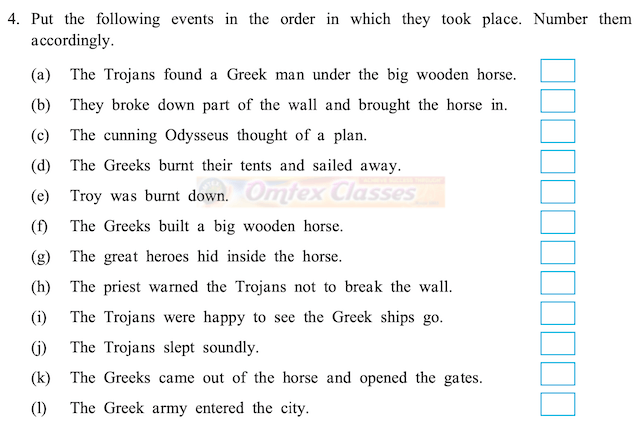Chapter 2: The Fall of Troy
Building a Story
Form groups of eight. The group leader prepares slips of paper for each of the seven points given below and distributes them among the others. The group sits in a circle, taking their seats according to the number on the slip they have. Then each one completes the sentence on his/her slip without sharing it with the others. The group leader collects the slips and reads all the sentences aloud as one continuous passage. Does the story make sense? The group then works on the story to make it more meaningful and interesting.
Once there was a ______________.
Who lived in a ______________.
He/She ate _________________.
She/He went _________________.
There she/he saw _________________.
She/He was _________________.
That is why _________________.
This game may be played again, changing the groups, to form new stories.
SOLUTION
Once there was a Prince named Joy.
Who lived in a big palace in the city.
He/She ate delicious food all day and enjoyed his life.
She/He went one day to his city's market area.
There she/he saw the sufferings of his people due to heavy taxation levied by his own father. the king.
She/He was shocked to see the plight of his own people and thus wanted to help them.
That is why he thought of speaking to his father and lowering the taxes on the goods in his kingdom.
As a result, the king also realized what wrong he had done and his kingdom became a happy one once again.
Why? : Form groups of five. Choose a familiar character from any one of the epics you know. One person from the group plays the role of that character. Others in the group frame questions related to that character’s life. The condition is that all the questions should begin with ‘Why ... ?’. They interview the character using these ‘Why-?’ questions. Practice and present the interview in the classroom.
SOLUTION
Epic: Ramayana
Character: Lord Rama
List of Why questions.
Why were you banished from your kingdom?
Why did your brother Laxman accompany you to the forest?
Why did you leave Sita and Laxman in the hut?
Why did Ravana kidnap Sita?
How?: Follow the above procedure. Now all questions should begin with ‘How-?’
SOLUTION
How many stepmothers did you have?
How many years did you live in the forest?
How many brothers did you have?
How did you defeat Ravana in the end?
Prepare a short script for your interviews.
SOLUTION
Do it Yourself.
Read the passage and name the following.
He composed the Illiad and Odyssey.
SOLUTION
He composed the Illiad and Odyssey - Homer.
He persuaded Helen to elope with him.
SOLUTION
He persuaded Helen to elope with him - Paris, a prince of Troy.
She was the wife of King Menelaus.
SOLUTION
She was the wife of King Menelaus - Helen.
He led the defense of Troy for nine years.
SOLUTION
He led the defense of Troy for nine years - Hector.
He was killed by a poisoned arrow that entered his heel.
SOLUTION
He was killed by a poisoned arrow that entered his heel - Achilles.

Find the antonym of the following from the passage.
barren × _____________.
SOLUTION
barren × fertile.
offended × _____________.
SOLUTION
offended × defended.
cowardly × _____________.
SOLUTION
cowardly × bravely.
peace × _______________
SOLUTION
peace × war.
surrender × _______________
SOLUTION
surrender × fight.
exposed × _______________
SOLUTION
exposed × covered or protected.
defenceless × _______________
SOLUTION
defenceless × well protected.

From other sources find synonyms of the following words used in the story.
great (hero)
SOLUTION
great (hero) - brave
beautiful (woman)
SOLUTION
beautiful (woman) - pretty
fight (verb)
SOLUTION
fight (verb) - defend
rich (city)
SOLUTION
rich (city) - prosperous
safe
SOLUTION
safe - well protected
strong (city)
SOLUTION
strong (city) - well guarded
brave
SOLUTION
brave - strong
Correct the following sentence using facts from the passage.
Troy traded in cattle and grass, with other cities.
SOLUTION
Troy traded in goods and grain with other cities.
During the war, Trojans jumped over the fort gates to fight the enemy.
SOLUTION
During the war, the Trojans closed the gates, and then the city was like a strong fortress/ quite sage from all attacks.
Helen eloped with Menelaus.
SOLUTION
Helen eloped with Paris, a prince of Troy.
Troy was attacked because it was a strong, rich city
SOLUTION
Troy was attacked to take revenge for the wrong done to Menelaus.
The Greek armies and heroes always defeated the Trojans.
SOLUTION
The Greek armies and heroes could never defeat the Trojans.
Both the enemies were eager to continue fighting.
SOLUTION
Both the armies were eager to end their fighting.
The great heroes avoided one another.
SOLUTION
The great heroes tried to kill one another.
Achilles was killed by an arrow that pierced his heart.
SOLUTION
Achilles was killed by a poisoned arrow that entered his heel.
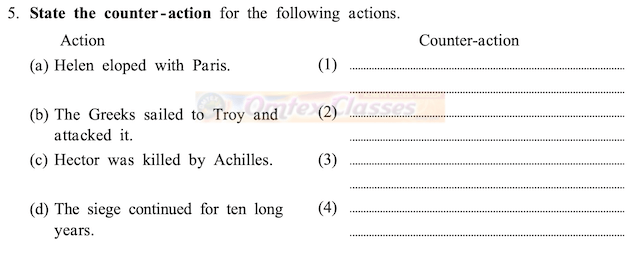
State the counter - action for the following actions.
SOLUTION

From either of our two Indian epics, find out which battle/war lasted the longest? Write down about its cause, the enemy armies, its heroes, its duration, and the final outcome.
Cause ___________________________
The enemy armie ___________________________
Heroes ___________________________
Duration ___________________________
Final outcome ___________________________
SOLUTION

Complete the following sentence with reference to the passage.
Epics are long poems that ______________________.
SOLUTION
Epics are long poems that relate to the needs of a great national hero or a great national war.
They may be composed and sung or recited for many years before __________________.
SOLUTION
They may be composed and sung or recited for many years before they are actually written down.
Nobody knows for certain who ___________________.
SOLUTION
Nobody knows for certain who the author of these epics is.
It is believed that _________ Homer, who __________ and who ________ to all who __________________.
SOLUTION
It is believed that The Iliad and The Odyssey were composed and recited by a blind poet named Homer, who lived about 900 BCE and who wandered from one Greek city or village to another, singing his poems to all who would receive him in their homes.
At the back rose the high peak of Mount Ida, from which _______________.
SOLUTION
At the back rose the high peak of Mount Ida, from which flowed many rivers and streams.
Underline the clauses in the below sentence and also the words that link or connect the clauses.
Epics are long poems that relate to the needs of a great national hero or a great national war.
SOLUTION
Main Clause: Epics are long poems
Subordinate Clause: that relate the deeds of the great national war.
Subordinating conjunction: that
They may be composed and sung or recited for many years before they are actually written down.
SOLUTION
Main Clause: They may be composed and sung or recited for many years
Subordinate Clause: before they were written.
Subordinating conjunction: before
Nobody knows for certain who the author of these epics is.
SOLUTION
Main Clause: Nobody knows for certain
Subordinate Clause: who the author of these early epics is.
Subordinating conjunction: who
It is believed that The Iliad and The Odyssey were composed and recited by a blind poet named Homer, who lived about 900 BCE and who wandered from one Greek city or village to another, singing his poems to all who would receive him in their homes.
SOLUTION
Main Clause: It is believed
Subordinate Clause: that The Iliad and the Odyssey were composed and recited by a blind poet named Homer
Subordinating conjunction: that
Subordinate Clause: who lived about 900 BCE
Subordinating conjunction: who
Subordinate Clause: who wandered from one Greek city or village to another, singing his poems to all
Subordinating conjunction: who
Subordinate Clause: who would receive him in their homes and give him hospitality.
Subordinating conjunction: who
At the back rose the high peak of Mount Ida, from which flowed many rivers and streams.
SOLUTION
Do it Yourself.
Find and write the Greek and Trojan names used in the story (Part I and II).
SOLUTION
Trojan names: Paris, a prince of Troy, King Priam, Hector.
Greek names: Helen, Menelaus, Achilles, Odysseus. and Agamemnon
SOLUTION
Strong wall, enemy, attack, a strong fortress, brave soldiers, kings, heroes, revenge, siege, fought, force, battles, armies, arrow, wounded, victory, burn, kill, weapons, enemies, and armour are some of the words related to the war that is used in the story.
Note the following construction carefully and then use them to express your ideas:
A horse big enough to hold men inside it.
_____________ enough to _______________________.
SOLUTION
I have a house big enough to entertain fifty people.
The Greeks were tired of the long war.
_____________ tired of _____________________.
SOLUTION
We were tired of our long journey.
The Greeks were tired of the long war.
_____________ tired of _____________________.
SOLUTION
We were tired of our long journey.
They are afraid of the long voyage home, too.
____________________ afraid of ____________________.
SOLUTION
We are afraid of the consequences of our mischief.
They made it too big to go inside your city.
_____________ too _____________ to _____________
SOLUTION
We were too tired to continue the game.
They were so excited that they paid no attention to his words.
_______________ so _______________ that _______________
SOLUTION
We were so happy that we danced with joy.
Put the following events in the order in which they took place. Number them accordingly.
SOLUTION

Form pairs. Imagine you are a pair of Trojans and you have come to know about Odysseus’s plan. Make a counter plan to defeat the Greeks. Write down your plan as you would explain it to your fellow Trojans.
SOLUTION
Listen to Trojan, I have come to know from one of our Spy about Odysseus’s plan that the big wooden horse that will come close to us won’t be an offering to the god of the sea but it is a conspiracy. There will be many soldiers hidden inside that wooden horse who will attack us on reaching here. So I have a plan, we will pretend to show them that we are assuming wooden horse as our destiny and as an offering to the god of the sea. But as soon as that horse will come close to us we will destroy it with cannons and save our Troy.

Identify one example of a main clause and one example of a dependent clause from the content below:
Troy was filled with the sight of leaping flames and the sound of shouting and the noise of weapons and the cries of weeping women. The sleeping Trojans sprang out of their beds, but they were taken by surprise. Their enemies were right inside their walls, and many of the Trojans were killed before they could put on their armour and seize their weapons.
A bright light lit up the night sky as palaces and houses, temples and towers, went up in flames. The Trojans fought as well as they could, but it was all in vain. Old King Priam was killed with all his brave sons. Hector’s wife and his old mother and sister were carried off as slaves by the conquerors. Their fate was in contrast to Helen’s when King Menelaus rushed through the city, looking for her, and found her in her palace. She hung her head in shame and sorrow as she faced her former husband. Her voice was choked with emotion and she could not speak. But Menelaus forgave her and she went back with him, for it was only Aphrodite who had turned her heart away from her home and her husband and her child.
When morning came, nothing was left of the proud, rich city that had resisted attack for ten years.
SOLUTION
Many of the Trojans were killed before they could put on their armour.
Main Clause: Many of the Trojans were killed.
Dependent Clause: before they could put on their armour.
It was only Aphrodite who had turned her heart away from her home.
Main Clause: It was only Aphrodite.
Dependent Clause: who had turned her heart away from her home.

Now read the beginning and end of a sci-fi story given below and complete the story using your imagination.
SOLUTION
'The Magic Glasses'
After ten years of diligent experimenting on 'light', Jayant, a brilliant scientist, created a pair of eye-glasses which would enable him to see through all opaque objects, doors, walls, metal structures, etc.
On Monday, he put on his 'magic' glasses and stepped into the busy street outside ...
He could easily see through any thick wall and get a clear view of whatever was happening on the other side. Brick, mortar, or metal, everything became see-through for him. If he wished to, he could even look through flesh and bone. He simply had to change the settings on his high-tech wristwatch. It was wirelessly connected to his special glasses and acted as a remote control. Be it an x-ray vision, night vision, or just seeing through dense objects, everything was a simple click away. But this was still a prototype, the first model of his great invention. The glasses were soon going to evolve into something truly marvelous. All he had to do was apply the upgrades he had in his genius mind. He was also planning to build a 'suit of invisibility'. It would make use of the same technology he used to make these unique specs. But that was for later, he was just going to enjoy the 'clear vision' his magic glasses were providing him with for now. All he needed was 'heat vision', and he could be just like his favourite superhero, Superman. "I'll keep that in mind while working on the upgrades. Superman would be so proud of me", he thought to himself with a chuckle.
He knew his invention was the next big thing in the world of science and technology. He knew he would go down in history as one of the greatest minds to have walked the Earth. His name would be taken in the same breath as Einstein and Newton. In his mind, he was already seeing himself as The World Ambassador of Science, a pioneering genius who would usher in a new age of next-generation technology. As wild as his imagination went, his invention was nothing short of magical. He was clearly able to see through the walls of the building in front of him. Everything was transparent. He could see the people inside the apartments. It was just then that his glasses showed him something that stunned him. He stood their jaw dropped as if being able to see through a concrete wall wasn't stunning enough already.
In one of the rooms on the third floor of the building, he could see that an old woman was being held hostage by three men. She was tied to a chair and one of them was threatening her while the other two vandalized the house. He guessed they were burglars as he could see the two men ransacking the place possibly searching for money and other valuables. Although a shiver ran down his spine, Jayant did not allow the panic to paralyze him. As fate would have it he saw a traffic cop nearby, drenched in sweat and dealing with the terrible rush of vehicles in the middle of the road. He rushed to him seeking help and almost dragged him to the building. Jayant's weird behaviour kind of confused the officer but before he could say anything, Jayant requested him to put on his glasses. He pointed at the 3rd floor of the building where the crime scene was taking place.
The officer was astonished, perplexed, and utterly overwhelmed by what he saw after putting on Jayant's glasses. As if the shock of being able to see through the wall wasn't enough, he panicked at the sight of the old woman tied to a chair being threatened by three men. The officer was dumbstruck, and he felt he was dreaming. He was in a daze but then the spell was broken when Jayant removed the specs from his face. He saw terror and awe in his eyes. Violently shaking the officer, Jayant urged him to call for backup. The cop nervously spoke on his walkie-talkie and did as Jayant instructed. The police soon arrived at the scene and the burglars were caught before they could cause any serious harm to the old lady.
This was truly turning out to be an extraordinary Monday for Jayant. While news of his Magic Glasses spread far and wide turning him into an overnight sensation across the globe, he was being hailed as a hero in his hometown. His act of courage and bravery had saved the life of an old lady. All the national and international awards in the field of science were definitely going to be his soon but right now the State was going to honour him for his heroic act. It was a big event, for, among other prominent personalities, all the world leaders and international scientists also graced the occasion. "Superman would be so proud of me", he thought to himself again with a chuckle even as he stood next to the Prime Minister of India. And so, ]ayant received the 'State Award for Brave Citizens'.

Read the following and observe the use of tenses.
‘Last week I witnessed a strange accident. Let me tell you about it. The signal flashes green. Vehicles start in the opposite direction. They move fast. Suddenly a speeding motorcyclist tries to cut across, from the wrong side. He is about to collide with a loaded truck. He applies the brakes. He falls and slides out with his bike from under the truck. He comes out unscathed on the other side.’
- When an event, which has occurred in the past, is narrated in the Present Tense to create a dramatic effect its Tense is called the ‘Dramatic Present Tense’.
- Now try to relate Jayant’s sci-fi story, in brief, in the dramatic past tense.
SOLUTION
As Jayant walks, he finds a bank door that is closed but there is no lock on it. He suspects something, he wears his magic glass and what is seen to him is that some bandits are trying to steal money from the bank officer’s by heading gun on them. Immediately he reports this to the police, the police reach the spot and surround the bank from all sides. He gets to know one more thing from the magic glass that there is no bullet inside the gun, when he informs this the police, the police take advantage of this opportunity and arrests all the bandits.
Balbharati Solutions for English Kumarbharati 9th Standard Maharashtra State Board
• Chapter 1.2: A Synopsis-The Swiss Family Robinson
• Chapter 1.3: Have you ever seen...?
• Chapter 1.4: Have you thought of the verb ‘have’
• Chapter 2.2: A True Story of Sea Turtles
• Chapter 2.3: Somebody’s Mother
• Chapter 2.4: The Fall of Troy
• Chapter 2.6: The Past in the Present
• Chapter 3.2: Reading Works of Art
• Chapter 3.3: The Road Not Taken
• Chapter 3.4: How the First Letter was Written
• Chapter 4.2: The Storyteller
• Chapter 4.3: Intellectual Rubbish
• Chapter 4.4: My Financial Career
.










